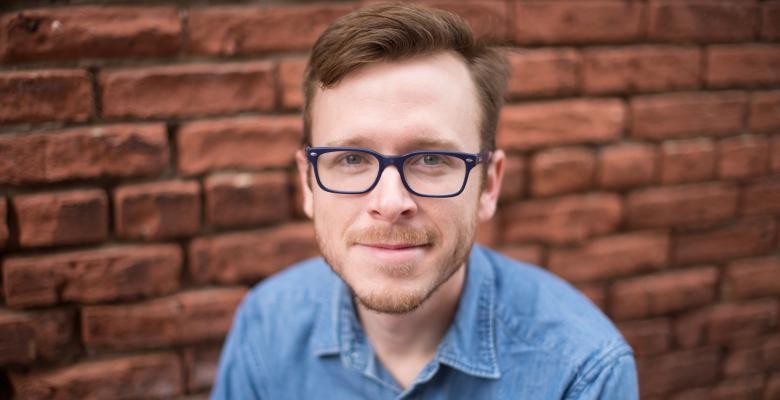5 Questions: Playwright Takes Brain Science to the Theater

Ben Hoover was working as a neuroscience researcher in a Johns Hopkins lab, and weighing a career in medicine, when he realized he might be able to combine his fascination with the brain and passion for theater into a new way of telling stories. The Mechanicsburg, Pa., native graduates this May with a Master of Fine Arts in playwriting from Columbia’s School of the Arts.
Q. What brought you to Columbia?
A. The faculty. Before Columbia I was still trying to decide whether I wanted to do research or be a practicing medical doctor. I’d always done theater on the side, but it became the thing that I wanted to pursue more. While in Baltimore, I worked on a Chuck [Charles] Mee play, doing props, and Chuck used to run the playwriting program at Columbia
Q. What’s been the best part about studying in New York City?
A. Getting to see plays. New York is one of the two remaining cities that are championing theater, London being the other one. Also, I think Columbia wants their writers to be connected. I’m an artistic apprentice at the Roundabout Theatre, one of the largest nonprofit theater companies in the country, as part of a partnership with Columbia. Being here and getting to see what people are doing and what’s new is really amazing and something that I don’t think you get anywhere else.
I also went to Shanghai during the winter of my second year as part of a partnership between the Shanghai Theatre Academy and Columbia. It was great to be taken out of my comfort zone. I learned about traditional Chinese opera and traditional Chinese story structure. I also drank a lot of cocktails because they have a burgeoning cocktail scene.
Q. Is there a course that inspired you in unexpected ways?
A. Lynn Nottage’s playwriting class pushed me. Every week it was a different assignment, often different ways of writing that I had never considered before, like using different source material or trying to write a speech of passion. Because of my science background, a lot of my writing is sort of cold emotionally. She really challenged me.
Q. How do you feel your neuroscience background contributes to your playwriting?
A. I have a show in Baltimore in June, Midlife, that I am then taking to Omaha, Neb. It’s set inside a woman’s head. She thinks that an older woman is taking over her consciousness in order to live forever. I’m trying to use the scientific theories that are currently being debated and tested as a way to inform the structure and content of the play.
Another play I’m working on is called In One Sense. I’m isolating narrative content and presenting it to an audience through one sense at a time. So telling a story through taste, or only through sight, or only through hearing. I’m using the science of how sensory perception works as a way to create new narrative tricks; for instance, stimulating memory through flavors.
Q. Is there one thing that defined your time here?
A. The ability to write weird things and fail is the one thing I’ve tried to always give myself the freedom to do.